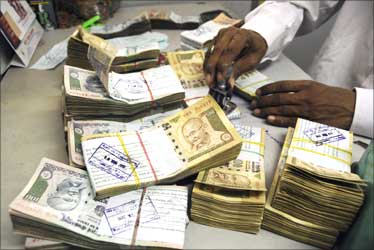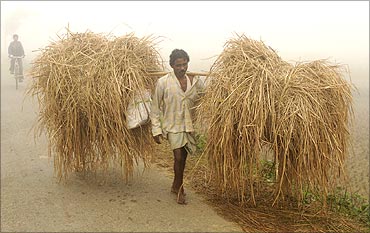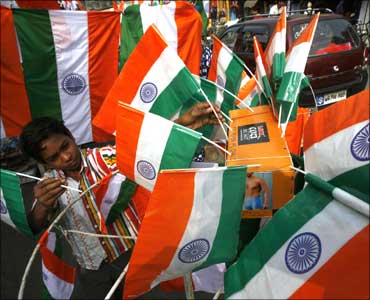Photographs: Reuters Rajni Bakshi
Imagine if we, the public, had easy access to all information pertaining to public projects. What if this access was naturally available for the entire cycle of the project, without struggling through the process of filing a Right to Information application?
It would become much harder for private entrepreneurs, bureaucrats and political leaders to break the rules for their own personal gain.
Suppose, still further, that all banks and other institutional investors were to apply strict performance standards on all those who borrowed money from them. With sufficient monitoring and implementation this could prevent many of the social and environmental conflicts that at present are stalling industrial projects across India.
At the moment much of this seems like a fantasy scenario. And yet there are some foundations upon which such procedures could be built.
. . .
Wanted: More information on public projects
Image: The Taj Mahal.Photographs: Reuters
A meeting held by the International Finance Corporation in Mumbai on January 13 offered some cautious glimmers of hope.
In 2006 the IFC adopted Performance Standards on Social and Environmental Sustainability. As the private sector wing of the World Bank group, the IFC has a presence all over the world. In 2009 IFC provided $14.5 billion in financing to clients in 103 countries.
So its standards can, potentially, make a tangible difference. It was on the basis of these standards that the 'Equator Principles', on social and environment responsibility, were crafted and then adopted by 50 of the world's leading investment banks.
The motivation for implementing such standards is more practical than moral. The IFC has found that complying with such standards enables companies to assess and manage risks -- resulting in fewer strikes, protests and environmental mess-ups.
. . .
Wanted: More information on public projects
Image: A farmer carries bundles of straw amid dense fog on the outskirts of Agartala, capital of Tripura.Photographs: Jayanta Dey/Reuters
Plus, the standards are supposed to "help clients find ways to maximize local development benefits and encourage the practice of good corporate citizenship." According to IFC literature, this allows companies to acquire a "social license to operate".
This is how it works: When IFC decides to work with a client the latter is required to comply with all its social and environmental performance standards. The IFC then undertakes a review and posts the results on its web site.
It expects the client to similarly reveal its compliances, through appropriate media, within the local community.
If a project is known to have adverse social impacts the IFC makes its own "formal determination of the level of community awareness of, and support for, the project."
. . .
Wanted: More information on public projects
During the course of the project IFC has systems for on-going monitoring, which include site visits by IFC staff. In addition it has a Compliance Advisor/Ombudsman (CAO), an independent entity that provides additional oversight and reports directly to the head of the World Bank group.
At the end of 2009 the IFC asked its stakeholders across the world for feedback on their experiences with the corporation's sustainability standards.
Over the last one year it has formulated a new set of standards accordingly. The draft of the new standards has gone through several consultative meetings, on different continents, ostensibly involving representatives of the private sector, government and activist groups.
The meeting in Mumbai on January 13 was the third and final consultation for South Asia.
. . .
Wanted: More information on public projects
What the new Performance Standards promise is greater access to information to details of the full cycle of IFC funded projects. They are also likely to require more transparency from the financial intermediaries that IFC funds, who in turn lend money to business.
The IFC's rule book will also define displacement not merely as physical removal from existing habitat but also loss of livelihoods.
Representatives of activist groups who attended the deliberations in Mumbai were not impressed. In July last year 56 NGOs from South Asia issued an open statement criticizing the lack of transparency and democratic participation in the framing of the new Standards.
What is the point of improving the standards on paper, asked the activists, when there is a big gap between the monitoring systems of IFC and the empirical reality? In practice the record of IFC's clients is still far from fulfilling such standards in either letter or spirit.
. . .
Wanted: More information on public projects
"How can you look forward without accounting for past and present mistakes and violations?" said M J Vijayan of the Delhi Forum.
Some activists argue that having such standards has created room for incremental improvements. Others argue that having such mechanisms has merely allowed many private companies to hide behind a mask of respectability, while in fact their operations are not much better than that of companies who are outside the ambit of such Standards.
Of course, the battle for proper implementation can be fought because the standards exist in the first place.
That is a substantial improvement over earlier times when it was not even considered wrong for industries to leave a trail of social and environmental devastation.
. . .
Wanted: More information on public projects
It is unrealistic to expect that Performance Standards can alter the fundamental imbalances between private capital and persons on the ground.
And yet there is merit in pushing for deeper and clearer access to information, as the IFC Standards promise. These are vital tools for those who struggle on the ground.
In particular, the concept of deep open access to information about the full cycle of a project deserves close attention -- for replication in the public arena. It could prove to be a vital tool for engaged and determined citizens.








article